June 23, 2017
Air Date: June 23, 2017
FULL SHOW
SEGMENTS
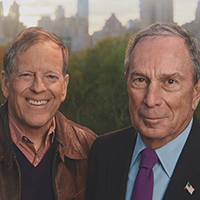
American Climate Action Goes Local
View the page for this story
President Trump is ending U.S. participation in the Paris climate Agreement, but more than 1,000 U.S. governors, mayors, businesses, and universities say “Not so fast”. Their “We Are Still In” declaration pledges that subnational jurisdictions and private enterprise will act to meet the US commitments to the Paris agreement. Former NYC Mayor Michael Bloomberg’s top climate aide Carl Pope tells host Steve Curwood why this coalition expects to succeed. (13:15)
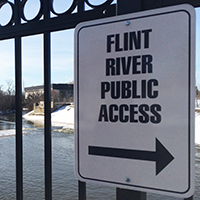
Flint Water Homicide Indictments
View the page for this story
On June 14th, Michigan Attorney General Bill Schuette brought indictments against Michigan Health and Human Services Director Nick Lyon and four other state officials for involuntary manslaughter related to their alleged failure to act in the Flint Water Crisis. Schuette claims the lead-contaminated water in Flint led to a deadly outbreak of Legionnaire’s Disease that the state employees failed to warn the public about. For legal insight into this unprecedented event, host Steve Curwood spoke with Vermont law School’s Patrick Parenteau. (07:05)

Industrial Air Pollution as Unhealthful as Second Hand Tobacco Smoke
/ Liz ReidView the page for this story
Children living near sources of pollution have virtually the same risk of developing asthma as those exposed to secondhand tobacco smoke, according to early results of a study in Western Pennsylvania. Carnegie Mellon researchers surveyed 1200 children living near the Pittsburgh area’s biggest polluters, as Liz Reid of The Allegheny Front and WESA reports. (05:00)

Beyond The Headlines
/ Peter DykstraView the page for this story
A heat wave’s no-fly zone, relaxed rules for reducing smog pollution, and a furry new product from Alaska are subjects Peter Dykstra and Living on Earth Host Steve Curwood tackle in their trip beyond the headlines. And the pair look backwards a hundred and ten years to a decision that tarnishes from Teddy Roosevelt’s conservation legacy. (03:10)

BirdNote: The Whiskered Auklet
/ Michael SteinView the page for this story
Alaska’s Whiskered Auklet nests deep inside rock crevices each spring, and BirdNote’s Michael Stein explains how its extraordinary long white whiskers come in handy. (02:00)
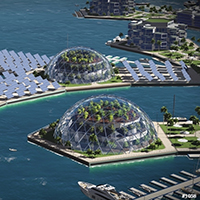
Seasteading: New Societies on the Floating Frontier
View the page for this story
California's Seasteading Institute has an audacious claim: establishing floating societies will “restore the environment, enrich the poor, cure the sick, and liberate humanity from politicians.” “Seavangelist” Joe Quirk, author of the new book Seasteading, explains this bold vision to host Steve Curwood. (16:00)
Show Credits and Funders
Show Transcript
HOST: Steve Curwood
GUESTS: Carl Pope, Patrick Parenteau, Joe Quirk
REPORTERS: Liz Reid, Peter Dykstra, Michael Stein
[THEME]
CURWOOD: From Public Radio International, this is Living on Earth.
[THEME]
CURWOOD: I’m Steve Curwood. While the Trump-led federal government has moved to get out of the Paris Climate Agreement many American states and cities are moving forward with climate protection.
POPE: The solutions we need to embrace -- like renewable power, mass transit, efficient buildings -- are locally profitable. Cities are the ones who are gonna make the profits and get the benefits from an innovation transition. And cities are also by their nature more innovative than the country as a whole.
CURWOOD: Also, local officials in Michigan face charges of homicide after several people die of disease directly linked to the toxic water in Flint.
PARENTEAU: I think it's historic. I can't think of another environmental disaster where five senior state officials have been charged with involuntary manslaughter for failing to warn the public.
CURWOOD: Those stories and more, this week on Living on Earth. Stick around.
[NEWSBREAK MUSIC: Boards Of Canada “Zoetrope” from “In A Beautiful Place Out In The Country,” Warp Records 2000]
[THEME]
American Climate Action Goes Local
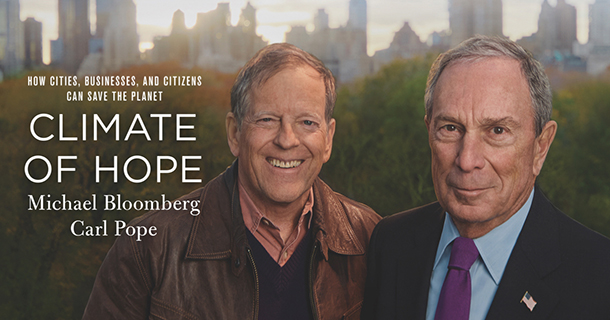
Carl Pope, the former Executive Director of the Sierra Club, and Michael Bloomberg, former New York City Mayor and currently the U.N. Special Envoy for Cities and Climate Change, co-authored the book Climate of Hope. (Photo: courtesy of Climate of Hope)
CURWOOD: From PRI and the Jennifer and Ted Stanley Studios at the University of Massachusetts Boston, this is Living on Earth. I’m Steve Curwood.
While the Trump-led federal government is moving to get out of the Paris Climate Agreement, more than a thousand local officials, including mayors and governors as well as business CEOs, are saying, “We’re Still In”. Former New York City Mayor Michael Bloomberg is among the prime movers of this coalition. He is now the U.N. Special Envoy for Cities and Climate Change, and his senior climate advisor is former Executive Director of the Sierra Club, Carl Pope.
Carl Pope joins me now, and, Carl, it’s great to talk with you again!
POPE: Wonderful to be with you again, Steve.
CURWOOD: So, this is a remarkable broad coalition of people representing vastly different interests. Who are some of the members?
POPE: At the moment we’ve got nine states, led by two of America's largest states, California and New York, over 150 cities, 1,500 businesses including big ones like Apple and little tiny ones like somebody's cookie shop in Manhattan. We've got 500 universities, and actually there's a separate group that came together independently but under exactly the same theme of 7,000 religious congregations - churches, synagogues, mosques, temples. It’s quite a remarkable coalition and it just kind of self-assembled in the three weeks it took Donald Trump to finally make the announcement that, I'm sure, he intended to make all along.
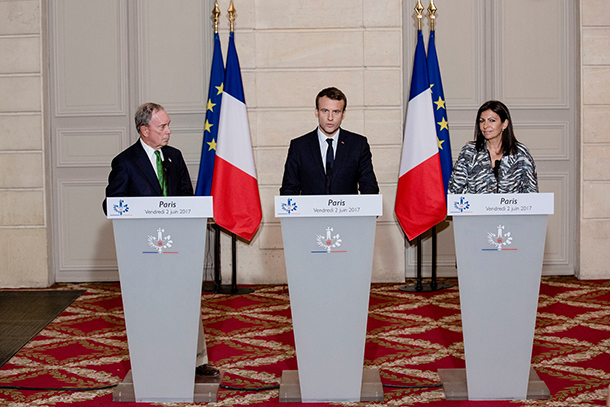
From left: Mayor Michael Bloomberg, French President Emmanuel Macron, and the Mayor of Paris, Anne Hidalgo at a joint press conference in the Élysée presidential palace on June 2nd, 2017. Bloomberg pledged to keep the U.S. a part of the Paris agreement through city, state, and business efforts. (Photo: courtesy of Mike Bloomberg)
CURWOOD: So, what does "We're Still In" aim to accomplish?
POPE: "We're Still In" aims to say to the world, “The United States will keep its word. We will meet our Paris pledge whether the Trump administration helps us do so or not”, and we’re actually going to as the next step create something called "America's Pledge" which will be a parallel nationally determined commitment which will reach the same goal, 26 to 28 percent reduction of climate emissions that Barack Obama promised in Paris. It won't go there by the same route. There are some things that Barack Obama was going to do as president that Trump has undone which cannot be done by cities and states, for example, regulating methane emissions on federal land. On the other hand, Barack Obama couldn't do very much about building codes because in the United States building codes are not a federal matter. They're a local matter. Mayors are going to be able to do a lot more to make buildings more efficient. So, what we can't do from some of the federal toolbox that Trump won't use, we're going to do with the state, city and private sector toolboxes that our supporters have available to them.
CURWOOD: Carl, how will the "We're Still In" coalition involvement in Paris be formalized.
POPE: Well, the first step’s already been taken. In his role as special envoy for climate in cities, Mike Bloomberg has transmitted the "We're Still In" signatories to the UNFCCC, and the UNFCCC has received that and noted it. What we will do next is to develop this parallel plan, and we will submit that to the United Nations, and then we will put in place a mechanism by which businesses, cities, churches, universities can report to us their progress, and we will track and monitor that progress, and, as we go down the next several years, we will report back to United Nations how America is doing to document the fact that not only did we promise to keep our word, we are actually keeping our word.
CURWOOD: And I'm imagining that you will take this report and submit it to the UN alongside the official federal response on the individually determined national commitments.
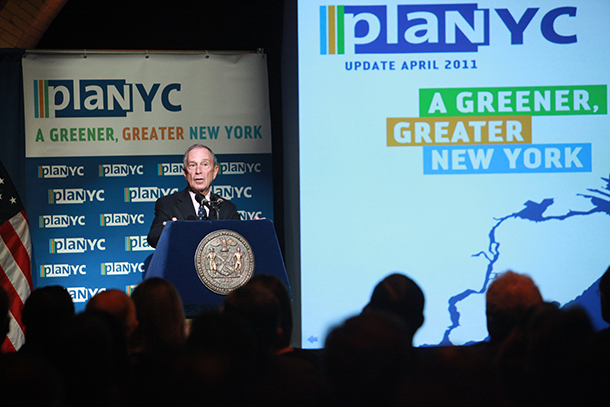
Former New York City Mayor Michael Bloomberg gives an update on PlaNYC, 2011. (Photo: courtesy of the City of New York)
POPE: Yes, we will design the report in a way that you can compare it to both the original Obama submission and to whatever alternative submission Trump makes if he chooses to make one.
CURWOOD: So, Mike Bloomberg is a special envoy of the UN for climate change. To what extent does that become a seat at the table during the climate negotiations since Mr. Trump has taken the federal government come out of that process?
POPE: Well, there's no mechanism by which somebody who is not a representative of a nation-state can have a seat at the negotiating table, but there are mechanisms by which they can interact with the negotiating process. Those have not yet been determined for the next COP at which people will be discussing their commitments. It will be 2020. In 2018, there will there will be a major stocktaking conference, and we'll certainly hoping and envisaging that United Nations will create a seat at the stocktaking process, not only for American cities, but for cities all over the world and for other players like private sector and regions and subnational states.
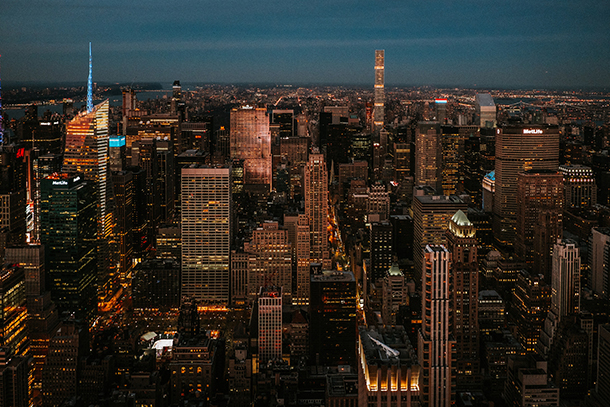
New York City at dusk. Cities including New York are leading the way on reducing greenhouse gas emissions, according to Pope and Bloomberg. (Photo: Jörg Schubert, Flickr CC BY 2.0)
CURWOOD: Carl, what is it about America's governance that makes cities in certain states more likely to take effective climate action than the federal government?
POPE: Well, what makes cities more inclined to take action is quite simply that taking action on climate, the solutions we need to embrace, like renewable power, mass transit, efficient buildings are locally profitable. Cities are the ones who are gonna make the profits and get the benefits from innovation transition, and cities are also by their nature are more innovative than the country as a whole. The national government is torn in multiple directions. We've got certain states, for example, that are very heavily dependent on fossil fuel production. Now, most of the country is an energy consumer not an energy producer, so for most of the country energy efficiency is enormously attractive because it saves money and makes you richer. On the other hand, if you're representing an oil dependent county in Texas or Oklahoma or a coal dependent county in Wyoming, energy efficiency is not such good news because it means lower sales and lower prices.
CURWOOD: As an example, please tell me a bit about the massive effort to green New York City that your co-author Mayor Bloomberg undertook called "PlaNYC".
POPE: "PlaNYC" was Mike Bloomberg's response to the good news he got when he arrived as mayor in New York City that the urban revival had already begun. New York City was going to add a million new people, and when his team brought him, they said, “The good news, Mr. Mayor, is that's going to be good for the city, good for the economy. The bad news is New York City's infrastructure cannot handle a million new people. We are going to have to make a major overhaul of New York City's infrastructure”. And when they looked at doing that, they also reported back to him, “It makes no sense to build things for yesterday's circumstances. We have to get ready for tomorrow”.
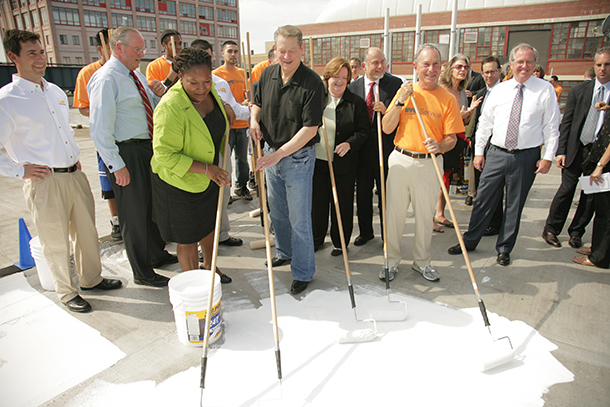
Michael Bloomberg and Al Gore paint a roof white during an event to launch NYC Cool Roofs, 2009. (Photo: courtesy of the City of New York)
So they took the opportunity to make a major rehaul of how New York handled its buildings and its transportation and its solid waste because those were the big three hings the city had control over. And one of Mike's favorite stories was one of the first things he did to encourage this process - the bottom-up process as well as the top-down process - was he and Al Gore went onto the roof of a building, I think in Coney Island, and painted it white as a way of demonstrating to people that you could actually reduce your utility bill on hot summer days a lot by just having a white roof, and, as Mike likes to say, when he used to fly into Kennedy Airport, he would fly over a sea of black asphalt, and now he flies over a sea of white roofs. So, people...They didn't make them do it, everyone did it because it made sense and probably not everybody did it, but most people did.
CURWOOD: So, how can cities finance the projects they need to undertake to do their part to combat climate change? How do you pay for it?
POPE: Well, the thing that's wonderful about these solutions is, they're lucrative. They're profitable. So, cities can borrow money and they will find bankers very eager to lend them the money, and they will be cash-flow positive as they pay the money back because they will be saving more from the innovation than they are paying to pay back the loan. So, for example, if you take a building and when tenants turnover you upgrade it and renovate it, the landlord and the tenant will be making more money because they'll be paying less money for the utility bill, and those savings will pay for the investment in the better windows or the less leaky walls.
CURWOOD: I want to switch subjects for a moment, Carl, and that is to talk about your highly successful effort to shutter coal plants while you were still at the helm of the Sierra Club. Of course, that was certainly aided by the natural gas boom, but still, President Trump says he wants to bring back coal jobs. How confident are you the coal industry will not be revived by Mr. Trump's rhetoric on this?
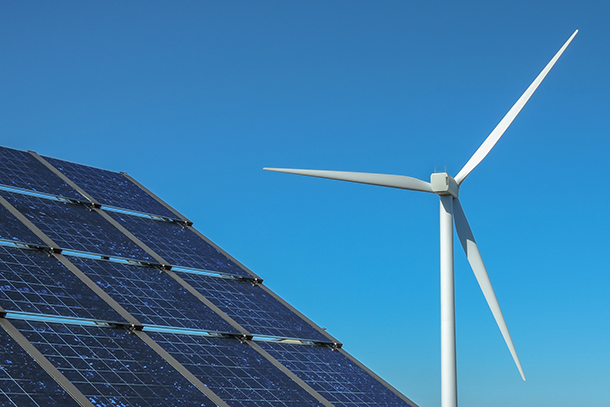
The prices of wind and solar energy are undercutting the cost of energy derived from burning fossil fuels in some parts of the country. (Photo: Ed Suominen, Flickr CC BY-NC 2.0)
POPE: Very confident. And even if the coal industry were to be revived by some unlikely change in international markets, jobs are not coming back because the jobs were in Appalachia. That's where there was coal mining underground. That was the labor-intensive part of the coal industry, and the coal seams in Appalachia are basically played out. Appalachia started losing market share to the Powder River Basin about two years ago because it could no longer compete even domestically for the production of coal. So, the jobs are sadly not coming back. I don't think the coal is coming back either, and Mr. Trump could talk about it but the reality is in a state like Texas producing a kilowatt hour of electricity with coal costs about six cents and producing a kilowatt hour of electricity with natural gas or with wind or with solar costs about three cents. So, the number of people who are willing to pay six cents to get a dirtier fuel is relatively small, and as evidence of this the National Museum of Coal Mining, which is in eastern Kentucky, recently switched its power source from coal to solar because solar energy was $10,000 a year cheaper for the museum.
CURWOOD: So, a lot of people who used to have those really good jobs mining coal…You went down in there, you might make $60,000, $70,000, $80,000, $90,000 a year. They're out of work, you said they're going to stay out of work. Those are not happy voters at this point. How can America embrace these folks who after all, in the previous iteration of our system, they created the support for the industry that we have?
POPE: Well, first I think we have to understand -- Mike and I point this out in "Climate of Hope" -- that the key to climate progress is rapid innovation. The fundamental thing that will determine how successful we are in combating climate change is how fast we innovate and how fast we turn over our capital stocks, but when you innovate and turn over capital stocks, some people are left out and left behind. We need to give those people what Mike and I call climate insurance.
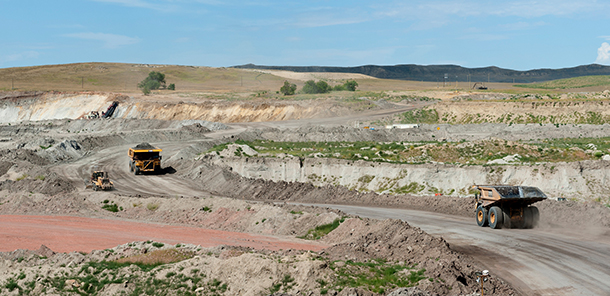
Now that coal seams in the Appalachian region have mostly played out, Wyoming’s Powder River Basin (PRB) has led coal production, providing 40% of America’s coal. But mining the PRB’s surface coal seams is a largely mechanized operation – meaning comparatively few mining jobs. (Photo: Max Phillips / Jeremy Buckingham MLC, Flickr CC BY 2.0)
We need to actually have a society in which, if you happen to be in an industry that is displaced by a more efficient or lower carbon innovation, you have an economic future, your community has a tax base, your pension and your health care are safe. We need to create a better safety net in this country if we’re going to accelerate innovation, which we need to do for climate change, but we also need to do for global competitiveness. Societies without safety nets are not going to do very well in the 21st-century, something the Republican Party doesn't seem to understand.
CURWOOD: So, the book that you just published, "Climate of Hope" with Michael Bloomberg makes the case for local action to preserve our planet. You called it “Climate of Hope”, so this is not all doom and gloom. And as I was reading it, I didn't find a whole lot of doom and gloom. But at the end of day, how can you really be hopeful in the face of…We've got rising seas and temperatures, we have more intense hurricanes, drought, we have political stalemate in many cases, regressive government in others. What gives you hope?
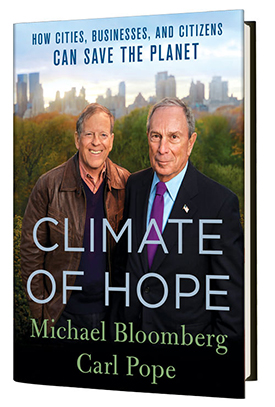
Climate of Hope. (Photo: courtesy of Climate of Hope)
POPE: Now, it is true we have already disrupted the climate. That disruption is going to come with a price. There will be more hurricanes, there will be more floods, there will be more droughts, and we are going to need to replace our current, somewhat brittle, infrastructure with more resilient infrastructure. But overall, the things that we need to do to curb climate change and to eventually reduce concentrations of greenhouse gases in the atmosphere are things that would be very good for us, and they’re things we know how to do. It isn't that hard to clean up the water in New York and let the oysters come back. There was one point in history when the New York metropolitan area had one-third of the world's oyster beds in that area alone. If we go back there, then the next time a hurricane comes, the storm surge will much smaller. So, it is those kinds of reliances on natural ecosystems that are going to enable us to the weather the storms we have unleashed.
CURWOOD: Carl Pope is the former Executive Director for the Sierra Club and senior climate advisor to Michael Bloomberg, the UN Special Envoy to Cities and Climate Change. Carl, thanks so much for taking the time with me today.
POPE: Terrific to be with you.
Related links:
- Bloomberg Philanthropies press release on “America’s Pledge”
- NYTimes: “Bucking Trump, These Cities, States and Companies Commit to Paris Accord”
- Climate of Hope book
- About Carl Pope
[MUSIC: “The President’s Own” United States Marine Band, “The Washington Post,” (Recorded on March, 3, 2009, in the John Philip Sousa Band Hall at Marine Barracks Annex in Washington, D.C., for the National Museum of the Marine Corps gallery titled "A Global Expeditionary Force 1866-1916.”), composed by John Philip Sousa]
CURWOOD: Coming up, some Michigan public officials are facing the prospect of jail for failing to protect public health. That’s next on Living on Earth.
ANNOUNCER: Support for Living on Earth comes from the Gordon and Betty Moore Foundation, and from a friend of Sailors for the Sea, working with boaters to restore ocean health.
[CUTAWAY MUSIC: “The President’s Own” United States Marine Band, “The Washington Post,” (Recorded on March, 3, 2009, in the John Philip Sousa Band Hall at Marine Barracks Annex in Washington, D.C., for the National Museum of the Marine Corps gallery titled "A Global Expeditionary Force 1866-1916.”), composed by John Philip Sousa]
Flint Water Homicide Indictments
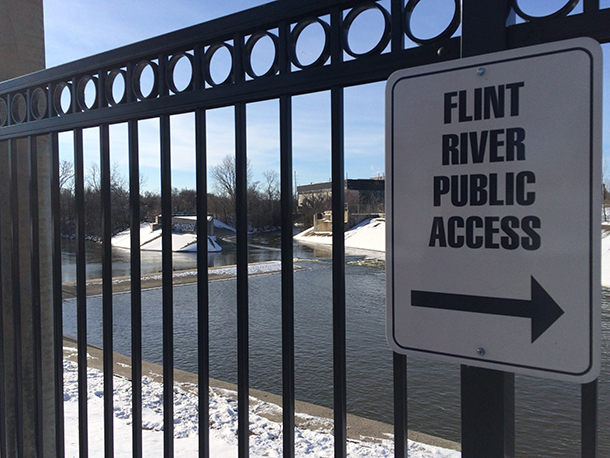
The Flint River has multiple public access points along the watershed. (Photo: Elizabeth Malloy)
CURWOOD: It’s Living on Earth, I’m Steve Curwood.
The attorney general of Michigan has charged the director of the state’s health department and four others with homicide in relation to the Flint water crisis. AG Bill Schuette indicted the five on counts of involuntary manslaughter in connection with an outbreak of Legionnaires’ Disease linked to the lead-contaminated water. Legionnaires’ apparently killed at least one man in Flint and maybe as many as twelve or even more. To put this in context, we turn now to Vermont Law School Professor and former EPA regional counsel, Patrick Parenteau.
Welcome back to the program, Pat.
PARENTEAU: Thanks, Steve. Good to be here.
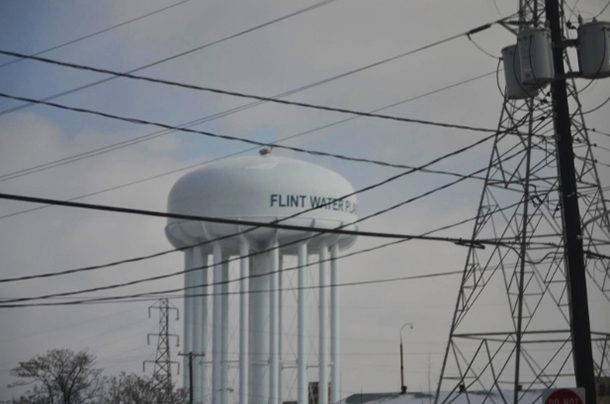
The Flint Water Plant. (Photo: Elizabeth Malloy)
CURWOOD: So, charging local officials with involuntary manslaughter. What kind of precedent does this set?
PARENTEAU: I think it's historic. I can't think of another environmental disaster where five senior state officials have been charged with involuntary manslaughter for failing to warn the public about, in this case, the outbreak of Legionnaires’ Disease which was associated with the lead contamination problem in Flint. This is a huge development in environmental criminal justice in America.
CURWOOD: So, we have five public officials here charged, including Nick Lyon, the Director of the Michigan Department of Health and Human Services. Who are the others and how are they linked and what exactly are the charges?
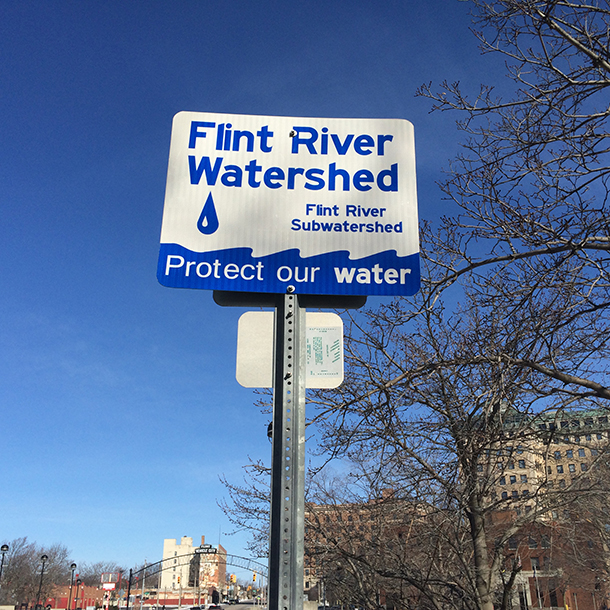
Along the Flint River are a variety of signs urging people to protect the watershed. (Photo: Elizabeth Malloy)
PARENTEAU: They're in different departments. There's some officials with the Michigan Department of Environmental Quality. There's some officials with the health department. There's some city officials as well, and of course involuntary manslaughter, the elements of the crime are unlawful death, homicide, gross negligence, reckless disregard and something that the law calls “depraved indifference”.
CURWOOD: What steps did Lyon take - Nick Lyon is the Director of the Michigan Department of Health and Human Services - What did he do that made him vulnerable to this charge?
PARENTEAU: Well, the allegation is that he knew about the Legionnaires’ disease outbreak and the, at least potential if not definite, association with the switch to the Flint River water supply, and the allegation is that he knew about this a full year before he announced anything to the public and warned the public. This was after people were dying, in fact, and then when he was questioned by the media, he said, "Well, people die all the time. I can't be expected to prevent all the deaths in Flint." Obviously that's some very, very serious charges against a public official.
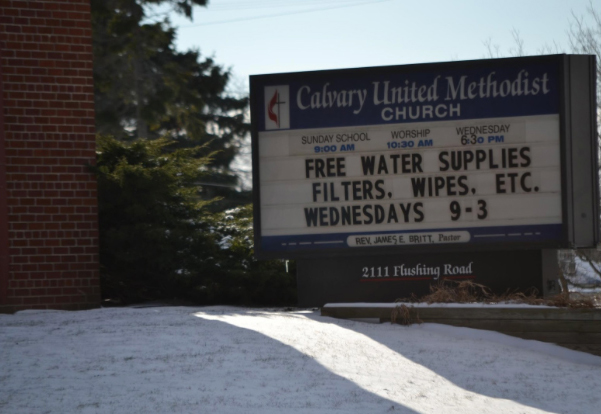
Many churches in Flint, Michigan have become major providers of every day resources for the community. (Photo: Elizabeth Malloy)
CURWOOD: Mr. Lyon works for Michigan's governor. Where is the Michigan Governor Snyder in all of this? What’s he saying and what are the risks that he would run of being charged as well?
PARENTEAU: Well, right after the indictments were announced, Governor Snyder came out with a very strong public statement expressing continued support for Lyon and the other key officials that were charged. Attorney General Shuette posed some questions to Governor's office which the governor declined to respond to. Some people have called for the attorney general to actually subpoena the governor, put him under oath, and ask him the same questions. The attorney general has yet do that. At his press conference, Shuette said he didn't have enough probable cause to charge the governor, but they also left open the possibility that this investigation was still ongoing, and that of course, when you start squeezing some of these defendants now, who knows what kinds of more information may come to light. The governor is not free and clear.
CURWOOD: Now, some of that argument is these charges are politically motivated. What's your take on that?
PARENTEAU: Well, Shuette's running for governor, so there's always some element of, are prosecutions politically motivated? I mean, so you can look at him as a hero or villain, I suppose, depending on where you sit.
CURWOOD: Now, Darnell Earley is the state appointed emergency manager for Flint, once the state took over Flint and involved in the original decision to use that river water. Pat, what's your feeling about the relationship of these charges to the anger that has been directed at him and the other officials in light of what happened?
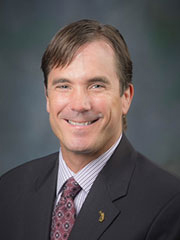
Nick Lyon is the Director of Michigan's Department of Health and Human Services (Photo: Official State of Michigan photo, public domain)
PARENTEAU: Well, the anger is certainly justified. I mean, he made a decision based on budget savings that would've saved on the order of hundreds of dollars per day to treat the Flint River water with the chemical that would have prevented the corrosion which released all that lead into the system. So, for saving that amount of money, you not only put all of these families and children at risk of lead contamination, but you triggered this Legionnaires’ Disease outbreak which took the lives of 12 people. That's a pretty high price to pay for saving the city's budget.
CURWOOD: So, moving forward, what are the next steps here?
PARENTEAU: Well, of course, there will be motions on the defense counsel, who have not surprisingly said this is an outrage and it's a case of prosecutorial abuse. So, there will be lots of motions challenging the basis for the indictment, but the real question is, are all these people going to insist on either a jury trial or a bench trial in front of the judge? You know, I can't imagine the jury in Flint, Michigan, being terribly sympathetic to these individuals, so there could be some kind of an argument about undue publicity, a change in venue, but the courts are reluctant to transfer venue away from the community that's affected by these alleged crimes. I really think we're going to see some plea agreements. I can't believe all five of these individuals are going to roll the dice and opt for a trial on these questions.
CURWOOD: To what extent is this case an environmental justice case? If it is, what are the elements to make it so?
PARENTEAU: Oh, it clearly is. I mean, this is a community with 41 percent of the population below the poverty line, 50-plus percent African American, overlooked, frankly, by the state officials. As horrible as the Legionnaires’ Disease outbreak was which resulted in these multiple deaths, the truth is that the kids who were poisoned by this lead contamination problem are going to have to live with the rest of their lives, and the city itself is still a long way from having even a safe supply of water years after this episode occurred.
CURWOOD: In your opinion as a legal expert, what are the odds that you think these officials could actually be found guilty on these latest charges?
PARENTEAU: My guess is that they won't be able to convict all of these people, but it's just a guess, but there's a real possibility here that somebody is going to do serious hard time in the penitentiary.
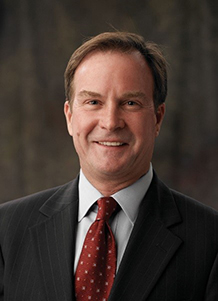
Michigan's Attorney General Bill Schuette. (Photo: Official State of Michigan photo, public domain)
CURWOOD: Well, we're all going to be watching this very closely. Let's just take a moment, Pat, to change subjects here. The head of the US Environmental Protection Agency recently said that he's not going to target the state of California and its EPA waiver for stricter pollution controls for vehicles there. And of course, that's key to California's whole climate protection plans there. What do you think about that decision?
PARENTEAU: I was surprised in Pruitt saying that EPA will not revisit the waiver for the California standards. That's a signal, I guess, that EPA is not going to try to roll back the fuel economy standards. I want to see more before I'm going to rely on that, but it's a curious signal that Pruitt just sent on that point.
CURWOOD: Patrick Parenteau is a professor of law at the Vermont Law School. Thanks so much for taking the time with us today, Pat.
PARENTEAU: You're welcome, Steve.
Related links:
- Centers for Disease Control and Prevention info about Legionnaires’ Disease
- NPR: “Lead-Laced Water In Flint: A Step-By-Step Look At The Makings Of A Crisis”
- State of Michigan’s Interim Report of the Flint Water Crisis Investigation
- Other criminal charges in relation to the Flint water crisis
Industrial Air Pollution as Unhealthful as Second Hand Tobacco Smoke

Four-year-old Ronan Annegarn, who lives in Pittsburgh’s Friendship neighborhood, was recently diagnosed with asthma. There is no history of asthma in his family. (Photo: Erin Halloran)
CURWOOD: Dangerous pollution can come in many forms, from dirty water to dirty air, and children are often the most susceptible. A survey conducted by Carnegie Mellon University of 1200 children living near some of biggest polluters in the Pittsburgh area shows that kids who live near sources of pollution run the same risk of developing asthma as those exposed to secondhand tobacco smoke. Allegheny Front contributor Liz Reid prepared this report.
REID: I’m sitting on a swing at the playground outside Woodland Hills Academy in Turtle Creek, Pennsylvania. I can’t see it or smell it… but according to data gathered by Carnegie Mellon University, I’m breathing in about eight parts per billion of nitrogen dioxide, and about five micrograms per cubic meter of black carbon.
That’s primarily because I’m downwind of US Steel’s Edgar Thompson Works in Braddock, just outside of Pittsburgh. The facility has been making steel for almost 150 years, and that entire time, nearby residents have been breathing in the pollution that it spews from its stacks, including the children of the Woodland Hills School District, and researchers are finding it's impacting their health.
GENTILE: For years we've had school nurses tell us a large percentage of children have asthma, that up to half the kids in our schools might have an asthma inhaler.
REID: That’s Deborah Gentile, an allergy and asthma specialist with the Pediatric Alliance. For two years, she’s been collecting data on asthma rates among elementary school children who live near sources of pollution, such as the steel mill in Braddock, Clairton Coke Works, and the Cheswick Power Station in Springdale.
GENTILE: It's running about 35 percent. And of those about two thirds of them or 24 percent actually know they have asthma. But we're diagnosing new asthma in about 10 percent.
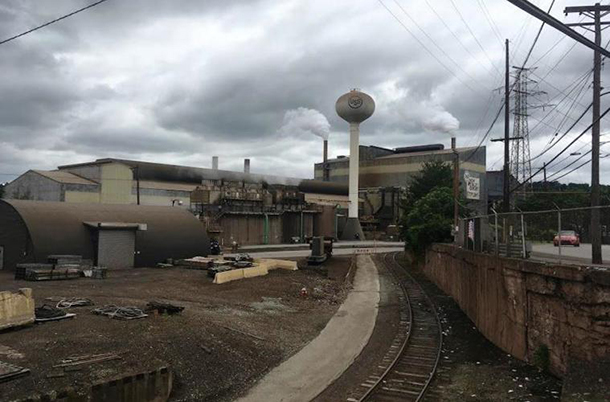
Pollution from U.S. Steel's Edgar Thomson steel mill in Braddock eventually makes its way into the lungs of children in nearby school districts. (Photo: Liz Reid / 90.5 WESA)
REID: By comparison, the national asthma rate is about eight percent. In Allegheny County as a whole, it’s 13 percent.
Gentile’s method is straightforward. She sends children home with a simple, four-question survey for their caretakers to fill out, asking how often the child has experienced symptoms such as wheezing, coughing or trouble breathing. Gentile compared the results of her survey with the Carnegie Mellon data, and found, unsurprisingly, that kids who live near point sources of pollution are more likely to have asthma.
GENTILE: The kids that are exposed to the highest level of PM 2.5s as well as the highest level black carbon are twice as likely to have a diagnosis of asthma as those who are exposed to the lower. So that really has to be a call for public policy change to clean this air up.
REID: PM 2.5 is particulate matter that is 2 and a half microns in diameter. For comparison, a human hair is about sixty microns in diameter. PM 2.5 is the main ingredient in black carbon, a byproduct of burning fossil fuels, the concentrations of which CMU professor Albert Presto measured.
PRESTO: Particulate matter is solid or liquid material that floats around in the air, and they're actually little particles. Right? They’re not gas molecules, they're little, you know, solid or liquid drops. Particulate matter is made up of literally thousands of different components.
REID: Because these particles are so small, they embed deep into the lungs. Particulate matter has been linked to health problems such as lung cancer, asthma attacks and even premature death, according to the American Lung Association. Nitrogen oxide also contributes to kids developing asthma or having more frequent attacks. Gentile says she’s particularly troubled by another aspect of the data.
GENTILE: Near these point sources of pollution we tend to see more minority families as well as more lower socioeconomic status and that's what they find in other cities as well. These are the people who can't afford to live elsewhere.
REID: Gentile says the pollution, and the asthma it causes, have far-reaching consequences in a child’s life.
GENTILE: As a doctor who takes care of children with asthma, I see them missing school, not being able to participate in activities, they're not sleeping at night, their parents aren't sleeping at night. It has a tremendous impact on their life.
REID: Gentile and her team are currently compiling all of the data from her surveys, and expect to put out a full report out later this year, with the goal of spurring government action. To start, she’d like to see asthma screenings mandated in schools. And she’s hopeful the data showing that a third of children near these pollution sources have asthma will be the push policymakers need to clean up the air in Allegheny County.
I’m Liz Reid.
CURWOOD: Liz Reid reports for public radio station WESA and the Allegheny Front.
Related links:
- The Breathe Project from Carnegie Mellon University
- The Allegheny Front
[MUSIC: Cindy Cashdollar, “Locust Grove” on Slide Show, Silver Shot Records]
Beyond The Headlines

Musk ox. (Photo: Pat M2007, Flickr CC BY-NC-ND 2.0)
CURWOOD: Time now for a look beyond the headlines with Peter Dykstra. Peter is with Environmental Health News, that’s EHN.org and DailyClimate.org, and joins us now on the line from Atlanta. Hi, Peter, how are you doing?
DYKSTRA: Well, I’m making progress Steve, and I have a novel item from Alaska, where they're trying out a new commercial product from the soft, thick fur of … musk oxen. Researchers are looking into harvesting the fur of the woolly beasts as a new fur substitute. Efforts to harvest musk ox fur actually began in 1964, but they're moving closer to actual commercial ranching of musk oxen as an innovative form of Alaska livestock.
CURWOOD: Huh, well that’s a really gigantic sheep, huh? Sounds intriguing. Hey, what else do you have?
DYKSTRA: Well quite a few signs of early summer heat, Steve. A conference last week in Portland, Maine, drew a crowd of people not normally associated with concerns about climate change - lobstermen, seeing their catch either declining or moving north to colder water.
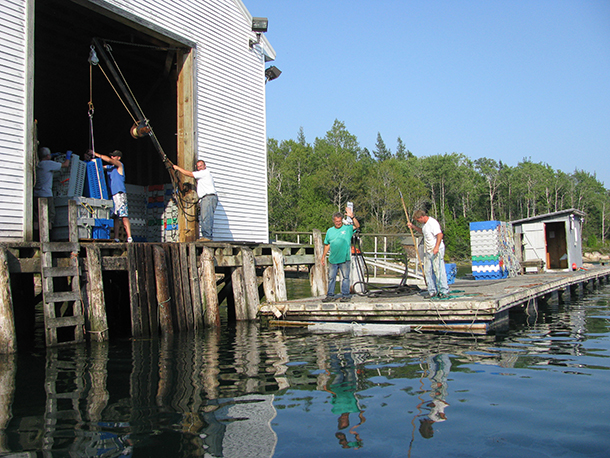
Lobstermen at Winter Harbor, Maine. (Photo: NatalieMaynor, Flickr CC BY 2.0)
CURWOOD: Yes, in fact you used to be able to get local lobster as far south as Long Island, but not so much anymore.
DYKSTRA: Yes and with the summer heat also come travel headaches. Just recently in Phoenix, it literally became too hot to fly, with dozens of flights canceled. And at ground level, stronger sunlight makes smog, turning pollutants into ozone. So get ready to choke on that Steve, as on June 6, 2017, US Environmental Protection Agency Administrator Scott Pruitt delayed by a full year the enforcement of tighter ozone standards that were set under the Obama administration.
CURWOOD: [COUGHING] Well, gee, thanks, Peter. Hey, what do you have from the history vaults this week?
DYKSTRA: Well, you know, we talk a lot about Teddy Roosevelt as one of the greatest conservationist Presidents, but a 110 years ago this week, TR made what many environmental advocates consider his biggest blunder, sealing the fate of the Owens Valley in California by shipping its water hundreds of miles away to the growing city of Los Angeles. The President declared that the valley’s water is, quote, “a hundred or a thousand fold more important to the state and more valuable to the people as a whole if used by the city of Los Angeles than if used by the people of the Owens Valley.” And what happened then is that the Valley dries up as water is diverted to serve LA.
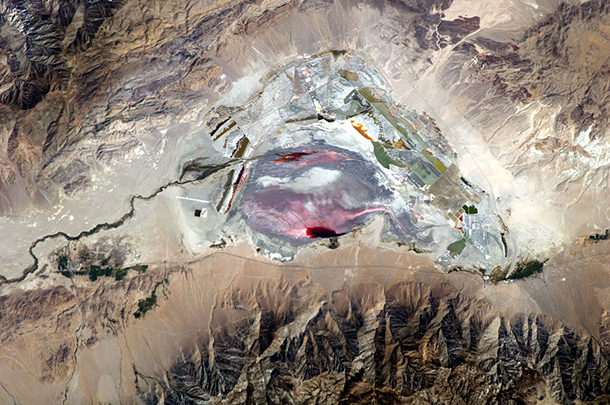
This photo from space highlights the mostly-dry Owens Lake and lower Owens River. Two bright red areas indicate the presence of salt-loving organisms known as archaeans. Gray and white materials within the dry bed are exposed sediments and salt crusts. (Photo: Johnson Space Center of the United States National Aeronautics and Space Administration (NASA), Public Domain)
CURWOOD: And so, Teddy Roosevelt wrote yet another chapter in southern California's water wars.
DYKSTRA: Yeah, he did. And decades later, a study determined that Owens Lake and the Owens River and other forfeited desert streams have become major sources of house dust for much of America.
CURWOOD: Huh, so I can think of Teddy Roosevelt every time I have to vacuum. Peter Dykstra is with Environmental Health News, that’s EHN.org and DailyClimate.org. Thanks, Peter we’ll talk to you again real soon.
DYKSTRA: Thanks, Steve. Talk soon.
CURWOOD: And there’s more at our website, LOE.org.
Related links:
- News Deeply: “Not Such a Woolly-Brained Idea: Alaskans Try Farming Musk Ox for Luxury Fiber”
- More on Maine’s International Lobster Conference
- E&E News: “EPA delays ozone rule”
- Owens Valley History
- Grist: “Photos of the once-mighty, now-drained Owens Lake”
BirdNote: The Whiskered Auklet

The Whiskered Auklet. (Photo: Toshiji Fukuda)
[MUSIC: BIRDNOTE® THEME]
CURWOOD: A number of boy birds have some pretty fancy plumage—think roosters and peacocks, and we assume it’s all about the avian mating game. But as Michael Stein explains in today’s Birdnote, sometimes those fancy feathers answer other needs.
http://birdnote.org/show/auklets-whiskers-not-just-show
Please include the entire transcript, from BirdNote® through the very last line of the document. Thanks!
BirdNote®
Whiskered Auklet: Those Whiskers Aren’t Just for Show
[Ocean waves and wind]
At dusk, in the far western reaches of Alaska’s Aleutian chain of islands, thousands of tiny Whiskered Auklets fly in, to nest in cavities deep in rock crevices.
[Whiskered Auklet calls, http://macaulaylibrary.org/audio/133048, 0.11-.13, repeated]
Whiskered Auklets are miniature relatives of puffins and murres. Charcoal gray, they're about eight inches long and owe their name to the long, slender, white plumes that sprout from their heads each summer — two rows down the side of the face and a third set that stands like antennae above their eyes. These fancy white plumes very likely play a visual role in courtship and mate selection. But they're not just for show.
[Whiskered Auklet calls, http://macaulaylibrary.org/audio/133048, 0.11-.13, repeated]
Scientists have recently learned that the auklets’ “whiskers” have an important sensory function, too. When the birds enter their cliff-side nest cavities, they find themselves in utter darkness. The “whiskers” enable the auklets to feel their way along in the dark. Much like the whiskers of a cat, they're acutely sensitive.
[Whiskered Auklet calls, http://macaulaylibrary.org/audio/133048]
By summer’s end, when nesting is done, Whiskered Auklets return to life on the open sea, like many seabirds. And with no dark crevices to navigate and no mates to impress, they molt their multi-purpose whiskers. Until next spring. I’m Michael Stein.
###
Written by Bob Sundstrom
Bird sounds provided by The Macaulay Library of Natural Sounds at the Cornell Lab of Ornithology, Ithaca, New York. Whiskered Auklet [133048 ] recorded by S S Seneviratne. Ambient sounds: Nature Sound 02 "Wind Mod Soft'; NatureSound 23 'Surf Mod Sandy' recorded by Gordon Hempton of Quiet Planet.com
BirdNote’s theme music was composed and played by Nancy Rumbel and John Kessler.
Producer: John Kessler
Executive Producer: Dominic Black
© 2005-2017 Tune In to Nature.org June 2017 Narrator: Michael Stein
Sources: Tim Birkhead’s Bird Sense
http://www.birdlife.org/datazone/species/factsheet/22694918; http://bna.birds.cornell.edu/bna/species/076/articles/breeding
http://birdnote.org/show/auklets-whiskers-not-just-show
CURWOOD: And for some photos, burrow on over to our website LOE.org.
Related links:
- Listen on the BirdNote website
- More about the Whiskered Auklet
[MUSIC: Pepe Barcellos featuring Mara Fernanda Torres, “Anhanga” on Lendas Do Nosso Brasil, Tex Studio De Danca (reissued on Brazilian Playground, Putumayo Kids)]
CURWOOD: Coming up...going down to the sea, but not necessarily in ships. That’s just ahead here on Living on Earth. Stay tuned.
ANNOUNCER: Funding for Living on Earth comes from you our listeners, and United Technologies - combining passion for science with engineering to create solutions designed for sustainability in the aerospace, food refrigeration and building industries. UTC companies such as Otis, Carrier, Pratt & Whitney and UTC Aerospace Systems are helping to move the world forward.
This is PRI, Public Radio International.
[CUTAWAY MUSIC: Cindy Cashdollar with Lucky Oceans & Redd Volkaert, “Speedin’ West” on Slide Show, Silver Shot Records]
Seasteading: New Societies on the Floating Frontier
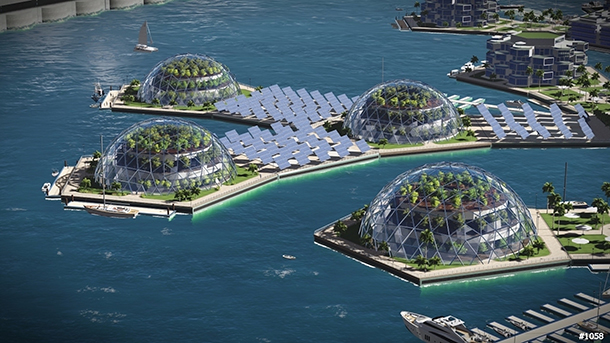
An artist’s concept of a seastead styled “Artisanopolis”, which would feature aquaponics greenhouse domes for growing food. (Photo: courtesy of Gabriel Scheare, Luke Crowley, Lourdes Crowley, and Patrick White, Chile)
CURWOOD: It’s Living on Earth, I’m Steve Curwood.
In the 19th century many people left the crowded, costly, and often corrupt cities in the eastern US to head to the rugged frontier out west, where folks could gain independence by claiming a patch of land and working it - homesteading. Today, there is little land available in developed societies for homesteading, but that’s not an obstacle for a movement looking to create a new social, economic and political frontier by living on the ocean. They call themselves “seasteaders”. And, taking advantage of modern technology, they are looking to live on the sea beyond the crowded, costly and often corrupt countries. That’s the vision of “Seavangelist” Joe Quirk, author of the new book "Seasteading: How Floating Nations Will Restore the Environment, Enrich the Poor, Cure the Sick, and Liberate Humanity from Politicians".
Joe, welcome to Living on Earth.
QUIRK: Thanks for inviting me.
CURWOOD: Joe, how did you get involved in the seasteading movement?
QUIRK: I was at my tenth Burning Man, and anyone that watches Burning Man grow over a decade becomes fascinated by the fact that rules emerge that are not predictable from their initial parameters, and you start imagining, what if we could have more societies like these? What if they didn't just last a week, but they lasted all year round? What if we could have hundreds? What interesting ways that people could get along would we discover?
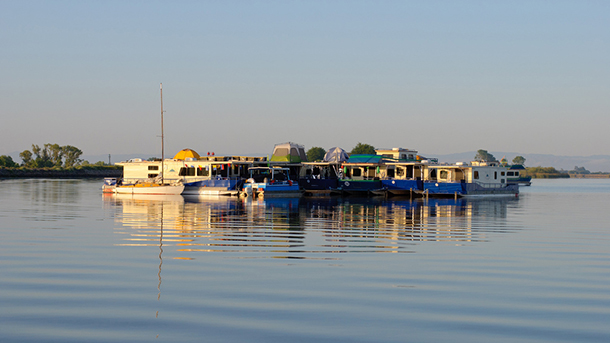
A placid morning at Ephemerisle in 2011 (Photo: Ben Chun, Flickr CC BY-SA 2.0)
And someone introduced me to Patri Friedman, and Patri Friedman told me about seasteading, and he described it as building floating cities on the sea, and as soon as I got home I noticed that the Seasteading Institute logo was based on the Burning Man logo. The Burning Man logo is basically a man with his arms to the sky, and the seasteading logo is a man with his arms to the sky with a cruise ship on top of it. And I wondered, why would cities on the ocean be inspired by a temporary city in the desert? I don't get it. What was that guy's name? Patrick Friesman? So I had to Google it. I had to figure out how to spell seastanding. and I discovered Patri's blog, and that's when I had my conversion moment.
I had just completed a book about evolution. I'd come to understand that progress comes from the magic recipe of variation and selection, and when Patri identified a problem that governance doesn't get better as quickly as other forms of technology because it doesn't vary or select except through revolution and war, and when he proposed that, if society floated and if these floating societies were disassemble-able and reassemble-able according to the choices of the residents, that would be variation by governments and selection by citizens. So, I solicited the Seasteading Institute, and said, “This can't be an obscure discussion amongst Silicon Valley bloggers. It needs to happen as soon as possible”, and I offered to co-write a populist book with Patri, not just about the ideas, but about the actual people trying to make it happen who I call “aquapreneurs”.
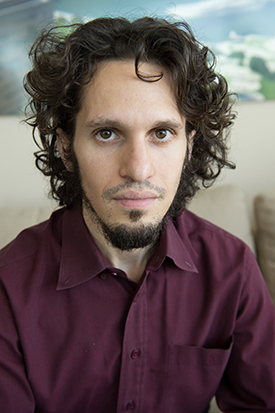
Patri Friedman founded the Seasteading Institute in 2008 with seed funding from PayPal founder Peter Thiel. (Photo: The Seasteading Institute)
CURWOOD: And tell me about Ephemerisle and what you've learned from this seasteading experiment there in the San Francisco area.
QUIRK: About here after the Seasteading Institute was founded, we kickstarted Ephemerisle with combines “ephemera” with “islands”, and it's basically a yearly festival in the Sacramento Delta which has been described as Burning Man on the water, and if you want to attend you have to bring your own land. So people rent boats, they get giant platforms, anything that can be put together to float, and the idea was that as people learn the lessons of living together on the water and solve technical challenges, it would slowly expand and move out to the sea.
CURWOOD: Now, when you tell the story of Ephemerisle, you guys come together, but then you split apart. What happened?
QUIRK: So, for about three years it was all peace and harmony, and by 2011 conflicts began to emerge. The people who wanted to dance and party clashed with the people who wanted to do a lecture series. The people who behaved like children clashed with the adults who brought children, and we had a big argument about what the real Ephemerisle was all about. By 2012, Ephemerisle split up into three islands and people with different ideas formed their little separate jurisdictions, and, no sooner were people living on separate islands, then a taxi system was spontaneously organized among the islands and everyone got along very well, and by the next year after that, some of the islands that fought most of all reached a compromise and rejoined.

The Seasteading logo was styled on the Burning Man logo (a man with arms raised). (Photo: The Seasteading Institute)
So, the social principles of seasteading have been demonstrated in microcosm at Ephemerisle, exactly as originally described by Patri Freedman, where he elucidated that if you lived on the fluid frontier and land was modular and disassemble-able, people who didn't get along could go vote with their house and go form their own separate jurisdiction. And as long as people could choose among them voluntarily, we think we'd create many different solutions for how to live together that would set examples that could change the world.
CURWOOD: Now, let's talk about the technology here, or rather, I should say “engineering.” It's certainly easy enough to have a floating platform in fairly shallow water but the part of the Earth that is ungoverned is deep ocean and parts of it have hundred foot waves at times. How do you engineer cities on the sea?
QUIRK: You are correct. Building in shallow waters is possible right now, and it's already been done on a small scale. Building in high waves is so expensive that only fossil fuel companies can afford it. So, how do we scale up?
We're starting in French Polynesia. We're negotiating with them to create a special, legal island known as a "sea zone" in their territorial waters so we can apply existing Dutch technology for sustainable floating islands in shallow waters to demonstrate the business model, two or three pilot platforms in a very small and nonthreatening way, such that we would absorb the risk, and if we succeed this could good bring prosperity to French Polynesians.
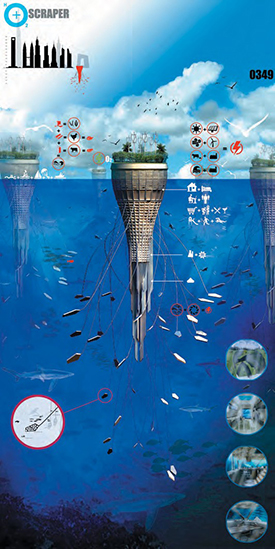
Seasteads like “Water-Scraper,” above, can be engineered to remain stable even in deep water and rough seas, says Quirk, by concentrating the bulk of their mass below the surface. (Photo: courtesy of Sarly Adre Sarkum, Nik Syazwan Nik Ab. Wahab, Amy Roshida Othman, Ahmad Azri Idrus, Muhamad Zharif Amir Sharifudin, Malaysia)
If it succeeds, we could attach more platforms in very shallow waters and what makes French Polynesia such an ideal place to start is that it's close enough to the equator that it doesn't experience high waves. It's very warm waters. It's not threatened by cyclones, and it is blessed with lots of natural wave breakers from atolls to lagoons and it also has lots of very deep water. This is the blue frontier where we can expand seasteading incrementally.
CURWOOD: Joe, I enjoy being on the ocean, but you know there are times, may I say, when it's a bit choppy. I mean, how comfortable are people going to be living at sea where things could be moving all the time?
QUIRK: You absolutely need to solve the seasickness problem if you're going to create civilization on the sea. I was on a cruise ship once, and I call it the "martini test", where if I can sit on the dock and order a martini and they can pour it right to the brim and it doesn't spill then I am in civil society.
CURWOOD: Although after the third martini you might not care.
QUIRK: [LAUGHS] I can create my own seasickness, but I'd rather the oceans not do it for me. And I've also watched elderly people putting on putting greens and playing miniature golf on cruise chips. Even oil platforms in very high waves are frequently stable enough for people to play ping-pong, and the solutions are known, and they're already in operation in some structures on the sea.
Basically you put a huge amount of ballast deep below the the ocean such that most of the mass is several hundred meters below the ocean. Then you can put your actual city up on pilings just as you can build a foundation on land, you can build a foundation on the ocean. And 60 feet above the waves, where they can get quite high, you can create a very stable platform, and if you're listeners are interested, they could look up the “flip ship” – “f”-“i”-“l”-“p” - which has been in operation on the ocean since 1962, and it has this deep ballast beneath the ocean such that only one sixth of the flip ship is above the ocean and it's been described as being as stable as a fence post in 60 foot waves. If you set up four flips and put a platform on it, you could create a very stable platform on the high oceans.
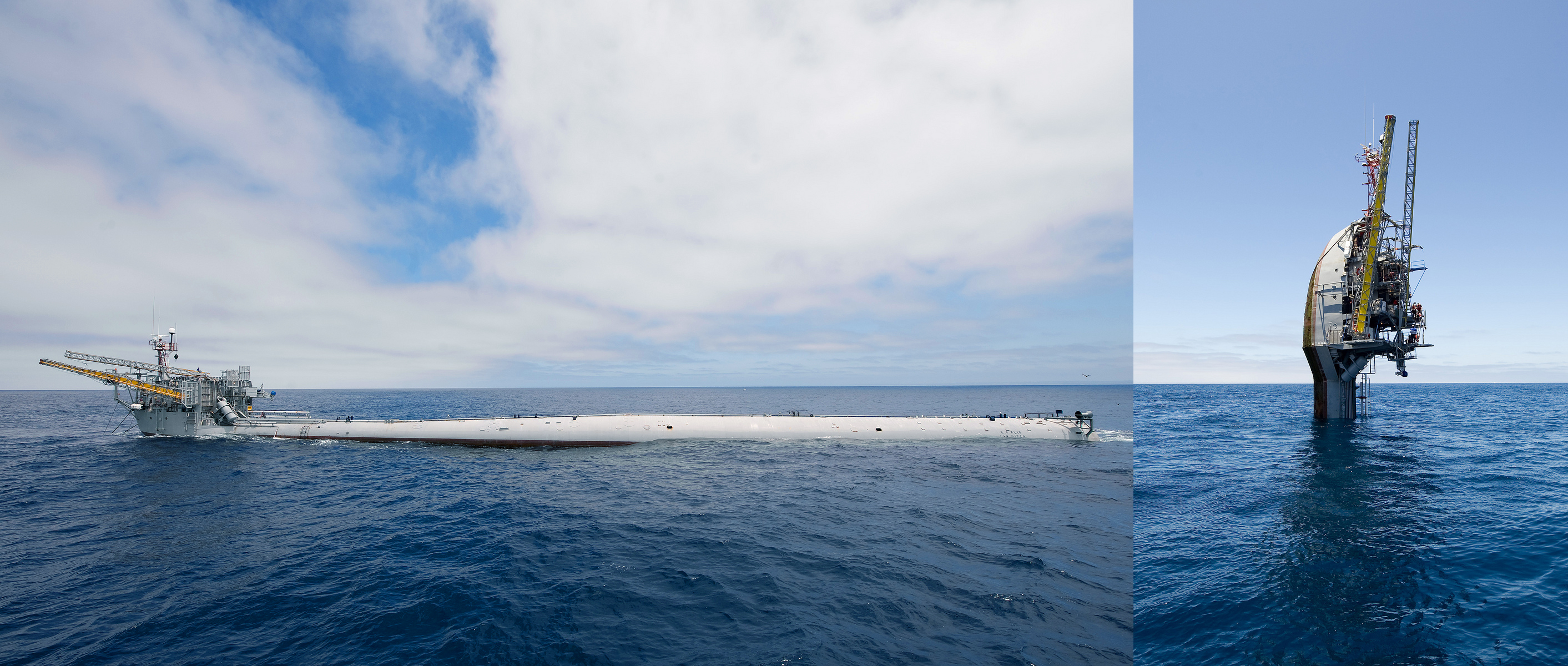
When turned on end, only 1/6 of the 355 feet of the FLIP (Floating Instrument Platform) ship poke above the surface of the ocean, providing great stability. (Photo: John F. Williams/U.S. Navy, Flickr CC BY 2.0)
CURWOOD: Joe, surely these floating nations are going to require a lot of construction material. How can that be sustainable?
QUIRK: Well, seasteading requires you to completely rethink the assumption we bring to land-based cities, which are generally not sustainable, they require huge amounts of wheat and corn and soy which cause all sorts of nutrient runoff emptying into the seas which often give rise to dead zones. But if you're floating cities in the ocean, you have to rethink all these assumptions. For instance, our initial floating islands could provide a home for sea life. They could reduce the sunlight that reaches the sea floor by just a few degrees, enough to lower the temperature of the surrounding waters, which could be enough to spark the restoration of the corals. As they scale up and go out into deeper waters, they could actually increase the amount of green life on the oceans.
The oceans are essentially a desert. Most of the nutrient wealth sinks below where photosynthesis can reach, so there's very little sea life out there, and less than one percent of the ocean is where most of the fish are fished because the fisherman rely on upwellings from the deep ocean which strike, say, islands or coasts and then drive up all this nutrient wealth. So, imagine if your cities increased the amount of greenery in the world, increased the number of ecosystems in the world, and provided a huge carbon sink. Algae is a larger carbon sink than the rainforests of the world, and it's comparatively easy to chop up seaweed, drop it to the deep ocean floor and remove it from the biosphere for tens of millions of years.
CURWOOD: Now, what about the fact that our tastebuds, our human tastebuds are accustomed to all sorts of things we get off the land - the wheat and corn and swiss chard and, for those who eat meat, the livestock. How are you going to get that at sea?
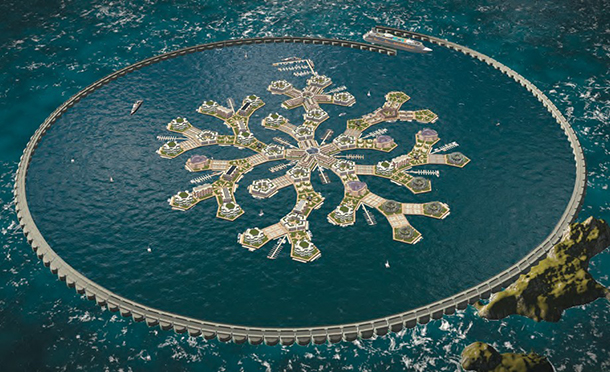
A modular wavebreaker would shelter the proposed Artisanopolis seasted in shallow coastal waters. (Photo: courtesy of Gabriel Scheare, Luke Crowley, Lourdes Crowley, and Patrick White, Chile)
QUIRK: Chances are pretty strong that the wheat or corn that you ate today was fertilized with algae, and we already eat algae every day. Algae products are in our toothpaste, it's in our beer, it's in our peanut butter. So, algae food already permeate the food eat every day, and they even nourish the land crops we eat every day, and the idea is to continue scaling this up on the seas. Seaweed and algae haven't undergone the artificial selection that have made corn, wheat and soy so tremendously productive. A lot of algae contains complete proteins, contain all the best fats, and Ricardo Radulovich who wants to scale up massive seaweed farms on the ocean imagines we could conceivably bioengineer or artificially select for sea crops to taste like tomatoes. There's a whole new world of healthier, more sustainable food that we have not developed yet, far beyond wheat, corn, and soy.
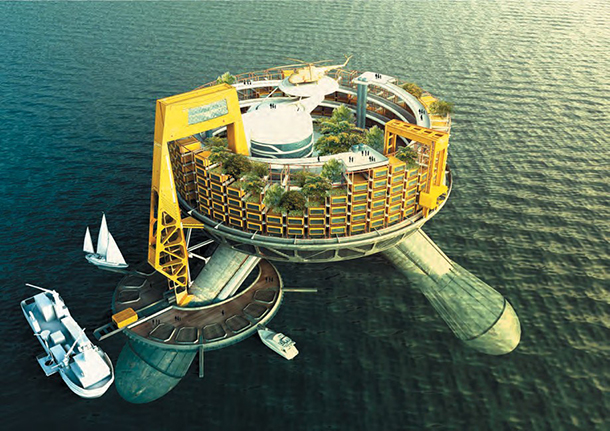
The first permanent businesses on the high seas could be sovereign floating hospitals that provide cutting-edge care to patients who choose them. (Photo: design concept by Edward McIntosh, 2014, Ecuador)
CURWOOD: Joe, let's cut to the chase though. There are some folks who, you know, they get up in the morning at the campsite especially they want that bacon.
[LAUGHS]
QUIRK: They might be interested in the bacon of the sea. So, somebody discovered that the seaweed dulse if smoked in a certain way tastes like bacon. And this been tested on gourmet chefs and gourmands who love to eat, and this just gives you a little hint of the types of foods we can develop using sea crops which are much more diverse and much healthier than the land crops we currently eat.
CURWOOD: Joe, how do you envision health care could change if people had access to floating medical care?
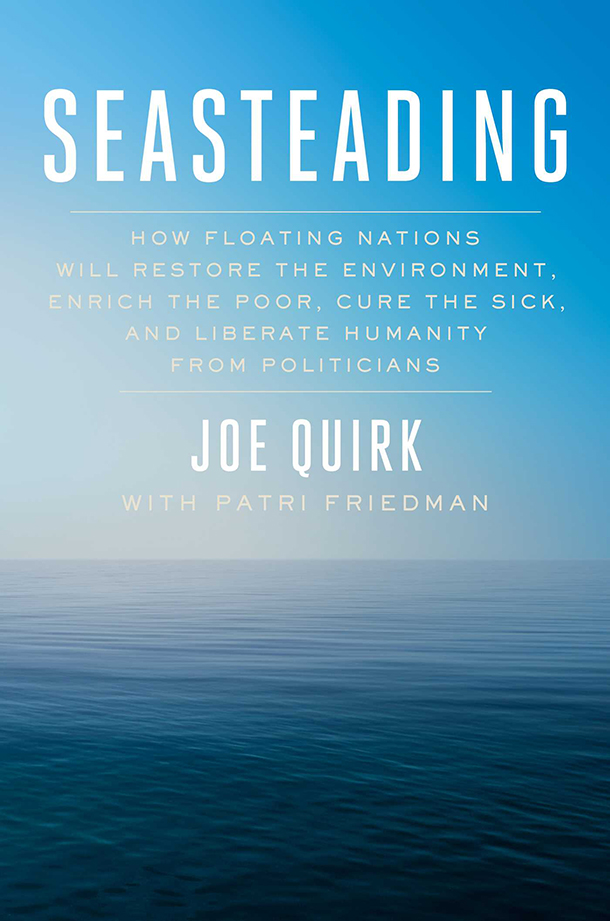
Joe Quirk and Patri Friedman’s book is called Seasteading: How Floating Nations Will Restore the Environment, Enrich the Poor, Cure the Sick, and Liberate Humanity from Politicians. (Photo: Simon and Schuster)
QUIRK: There should be more options than just national health care. The great thing about seasteading is that if you like your government, you can keep your government. But if other people can try other systems that could potentially work better and absorb the risk of that, we could learn something new about the kind of health care that's possible in the 21st century. Lots of medical entrepreneurs and physicians have reached out to the Seasteading Institute, saying, if you can provide me a seastead just off the coast of an existing American city, I could provide much better, much more humane, much cheaper and more efficient health care, if you guys can provide this for me.
CURWOOD: Now, you mention French Polynesia. A little further south in the Pacific are a number of nations that are threatened with innundation from the climate disruption. I'm thinking of Tuvalu, Kiribati, the list goes on. How much of a solution is your approach of seasteading in those places?
QUIRK: One of the biggest problems in the world is sea level change threatening coastal countries and especially Pacific island countries. Seasteading is an immediate solution to this problem. French Polynesia sees itself as the blue frontier, and they are initiating the blue economy, and they want to get this started in French Polynesia to demonstrate that this can work.
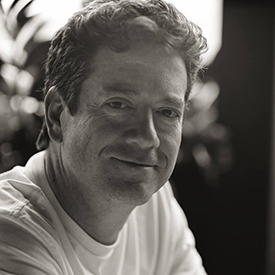
Joe Quirk is the “Seavangelist” of the Seasteading Institute as well as a science writer, novelist, and memoir ghostwriter. (Photo: courtesy of Joe Quirk)
Next door to French Polynesia is Kiribati, which is scheduled to sink below sea level before the end of this century. And you can imagine that as the islands sink they could steadily transition into become floating islands, especially since the islands will be just below the surface of the ocean, and you can tether to them. Then they would be called seamounts, and once that precedent is set, and our seasteading lawyers argue on the floor of the United Nations that Kiribati still deserves sovereignty even though they don't have physical islands left, you can imagine another floating nation being built somewhere next door. If people like these flooding nations and they are no threat to the world and they're providing better solutions and they are as delightful as cruise ships, I think we have a humanitarian case to petition the nations of the world, to recognize these floating nations as sovereign.
CURWOOD: Joe Quirk's new book is called "Seasteading: How Floating Nations Will Restore the Environment, Enrich the Poor, Cure the Sick, and Liberate Humanity from Politicians". Joe, thanks so much for taking the time with me today.
QUIRK: Thank you for inviting me. I really enjoyed the conversation.
Related links:
- The Seasteading Institute
- Watch how the FLIP ship flips
- The philosophy of Burning Man
[TURKEYS GOBBLING; TURKEY ROOST, PATAGONIA-SONOITA PRESERVE]
https://soundcloud.com/musicofnature Wild turkey Roost]
CURWOOD: We leave you this week just outside Patagonia, Arizona.
[TURKEYS GOBBLING]
CURWOOD: No prizes for guessing what these noisy birds are.
[TURKEYS GOBBLING]
CURWOOD: It’s dawn, and the wild turkeys who've roosted all night in a tall sycamore tree are heading off to find breakfast, and making sure everybody knows about it.
[TURKEYS GOBBLING]
CURWOOD: Lang Elliott made this recording for his Music of Nature Series at the Patagonia-Sonoita Nature Preserve.
[MUSIC: Dorothy Ashby, “Dancing On the Ceiling” on The Jazz Harpist, by Richard Rogers/Lorenz Hart, Regent/Trunk Records]
CURWOOD: Living on Earth is produced by the World Media Foundation. Our crew includes Naomi Arenberg, Bobby Bascomb, Savannah Christiansen, Jenni Doering, Matt Hoisch, Noble Ingram, Jaime Kaiser, Don Lyman, Lizz Malloy, Alex Metzger, Helen Palmer, Adelaide Chen, and Jolanda Omari. And we welcome intern Olivia Reardon this week. Tom Tiger engineered our show, with help from Jeff Wade and Jake Rego. Alison Lirish Dean composed our themes. You can find us anytime at LOE.org -- and like us, please, on our Facebook page -- it’s PRI’s Living on Earth. And we tweet from @LivingonEarth. I'm Steve Curwood. Thanks for listening.
ANNOUNCER1: Funding for Living on Earth comes you, our listeners, and from the University of Massachusetts, Boston, in association with its School for the Environment, developing the next generation of environmental leaders. And from the Grantham Foundation for the protection of the environment, supporting strategic communications and collaboration in solving the world’s most pressing environmental problems. Support also comes from the Energy Foundation, serving the public interest by helping to build a strong, clean, energy economy, from Carl and Judy Ferenbach of Boston, Massachusetts and from SolarCity, America’s solar power provider. SolarCity is dedicated to revolutionizing the way energy is delivered by giving customers a renewable alternative to fossil fuels. Information at 888-997-1703. That’s 888-997-1703.
ANNOUNCER2: PRI. Public Radio International.
Living on Earth wants to hear from you!
Living on Earth
62 Calef Highway, Suite 212
Lee, NH 03861
Telephone: 617-287-4121
E-mail: comments@loe.org
Newsletter [Click here]
Donate to Living on Earth!
Living on Earth is an independent media program and relies entirely on contributions from listeners and institutions supporting public service. Please donate now to preserve an independent environmental voice.
NewsletterLiving on Earth offers a weekly delivery of the show's rundown to your mailbox. Sign up for our newsletter today!
 Sailors For The Sea: Be the change you want to sea.
Sailors For The Sea: Be the change you want to sea.
 The Grantham Foundation for the Protection of the Environment: Committed to protecting and improving the health of the global environment.
The Grantham Foundation for the Protection of the Environment: Committed to protecting and improving the health of the global environment.
 Contribute to Living on Earth and receive, as our gift to you, an archival print of one of Mark Seth Lender's extraordinary wildlife photographs. Follow the link to see Mark's current collection of photographs.
Contribute to Living on Earth and receive, as our gift to you, an archival print of one of Mark Seth Lender's extraordinary wildlife photographs. Follow the link to see Mark's current collection of photographs.
 Buy a signed copy of Mark Seth Lender's book Smeagull the Seagull & support Living on Earth
Buy a signed copy of Mark Seth Lender's book Smeagull the Seagull & support Living on Earth

